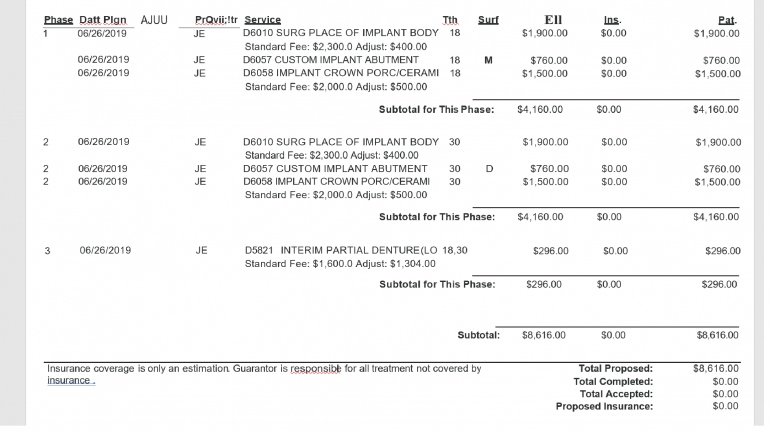
Dental Code D1320: Tobacco counseling for the control and prevention of oral disease
Dental Code D1320 refers to tobacco counseling, a vital component of preventive dentistry that aims to control and prevent oral diseases associated with tobacco use.
Dental Code D1320 Price Range & Savings
On average, patients pay $80 for this D1320 service at the dentist's office, with as little as $40 charged for this in less expensive cities and as much as $100 in more expensive cities.
Low cost of living | Medium cost of living | High cost of living |
Memphis (Tennessee), Cincinnati (Ohio) | Miami (Florida), Denver (Colorado), Austin (Texas) | (New York (New York), San Francisco (California) |
$40 | $80 | $100 |
However, the price for the service D1320 depends not only on the region where you live, but also varies from dentist to dentist. Therefore, it makes sense to compare prices before choosing a dentist. The best way to do this price comparison is at Dr. BestPrice and save a lot of money.
What does Dental Code D1320 mean? Detailed information about the procedure and the steps of the whole process
Dental Code D1320, or tobacco counseling, involves a systematic approach by dental professionals to help patients overcome tobacco addiction and promote oral health. It focuses on educating patients about the harmful effects of tobacco use, providing support to quit, and preventing oral diseases associated with tobacco consumption.
Initial Assessment
During the initial assessment, the dental professional will gather relevant information about the patient's tobacco use history. This includes the frequency and duration of tobacco use, the types of tobacco products used (such as cigarettes, cigars, or smokeless tobacco), and any previous attempts to quit. The dentist will also assess the patient's oral health and discuss the potential risks associated with tobacco use.
Understanding the patient's tobacco use habits helps the dental professional tailor the counseling approach and develop a personalized quitting plan. It also provides valuable information regarding the patient's level of nicotine dependence and the potential oral health complications they may face.
Patient Education
In this step, the dental professional educates the patient about the detrimental effects of tobacco on oral health. They explain how tobacco can lead to conditions such as gum disease (periodontitis), oral cancer, tooth discoloration, bad breath (halitosis), and compromised healing after dental procedures. Visual aids, such as photographs or diagrams, may be used to enhance the patient's understanding.
During the education process, the dental professional explains the specific mechanisms by which tobacco affects oral tissues. For example, cigarettes contain harmful chemicals that can irritate the gums, causing inflammation and increasing the risk of gum disease. Smokeless tobacco products, on the other hand, can cause oral lesions and contribute to the development of oral cancer.
Risk Assessment
The dental professional evaluates the patient's risk of developing oral diseases due to tobacco use. This assessment takes into account factors such as the presence of existing oral health issues (e.g., gum disease or tooth decay), the duration and intensity of tobacco use, and the patient's overall oral hygiene practices.
By assessing the patient's risk, the dental professional can determine the severity of the oral health consequences associated with tobacco use. This information helps in tailoring the counseling approach and setting achievable goals for the patient.
Development of a Quitting Plan
Based on the patient's individual needs and preferences, the dental professional assists in developing a personalized quitting plan. This plan may involve setting a quit date, exploring various tobacco cessation methods, and identifying strategies to cope with withdrawal symptoms and triggers.
The dental professional explains the different tobacco cessation methods available, such as nicotine replacement therapy (patches, gum, or lozenges), prescription medications, counseling, or support groups. They discuss the benefits and potential side effects of each option, helping the patient make an informed decision.
Additionally, the dental professional works with the patient to identify specific triggers or situations that make it challenging to quit tobacco use. Together, they develop strategies to manage cravings and find healthier alternatives or distractions.
Behavioral Support
Tobacco counseling provides ongoing behavioral support to patients throughout their quitting journey. Dental professionals play a crucial role in motivating patients, reinforcing their commitment to quit, and providing guidance on coping mechanisms and stress management techniques.
Regular follow-up appointments are scheduled to monitor progress, address concerns, and provide additional support. The dental professional may offer encouragement, praise milestones, and provide resources such as self-help materials or referrals to support groups.
Referral to Specialists
In some cases, dental professionals may need to refer patients to specialists such as tobacco cessation counselors, psychologists, or physicians for comprehensive treatment. This ensures that patients receive the necessary support to overcome tobacco addiction successfully.
Summary of Dental Code D1320
Dental Code D1320, referring to tobacco counseling, is an essential component of preventive dentistry. By educating patients about the harmful effects of tobacco use, providing support to quit, and preventing oral diseases associated with tobacco consumption, dental professionals play a crucial role in promoting oral health and overall well-being.
Through a systematic approach involving initial assessment, patient education, risk assessment, development of a quitting plan, behavioral support, and referrals, dental professionals can effectively help patients overcome tobacco addiction and prevent oral diseases. By addressing the unique needs and challenges of each patient, tobacco counseling contributes to better oral health outcomes and a higher quality of life.
Start your better life today! Compare prices and find the best options for your dental health and oral treatments. with Dr. BestPrice - Your gateway to smart dental choices! Seamlessly compare costs, make informed decisions, and ensure your smile sparkles without straining your finances.
